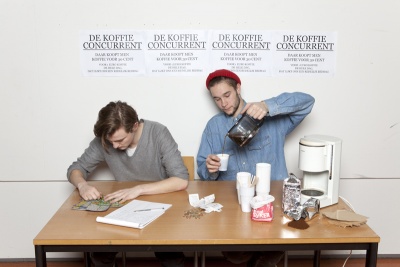User:Roelroscama/creativeIndustries
Background / De Koffieconcurrent
De koffieconcurrent was a shop that sold very affordable cups of coffee in the hallways of the Willem de Kooning Academy. It's business model was as simple as it was mad: To sell cheap coffee and to buy lottery scratchcards with the proceedings at the end of the day. The potential for insane returns and soaring profits was tempting and seemingly within reach for the duration of the month. After a month of running the Koffieconcurrent we made 24 euros with the sales of coffee. After investing these in scratchcards the balance totalled 22 euros.
The project on www.the-force-of-freedom.com
Lottery as a businessmodel
There seem to be interesting parrallels in:
- artists trying to be discovered through calls, paid entries to competitions etc. Willing to work un(der)paid for long itmes in the hope of fame/money/career - people running tech-startups investing massive amounts of time and resources in the hopes of discovering something to attract venture capital or being being bought-up by technology firms. - gamblers willing to continue playing against the odds in the hopes of striking the one lucky time that justifies all.
Eventhough most participants in these 'lotteries' lose, or do not gain in in a big way, they keep participating. Inspired by the few examples of those that became lucky.
Gamblers betting on games/lotteries often rely on pseudo-rationalization to justify why they of all people will win. Relying on lucky numbers, detecting patterns etc. to give them an edge.
The same goes for start-ups and artists. Rationalizing their marginal existence and low odds of success on pseudo-rational reasoning. "If I do this job un(der)paid now.. I have a chance to get a paid one next time". (Then again this is a very economic way of reasoning and as Hans Abbing suggested, artists defy the laws of economics and value other forms of reward over economic gain.)
As stock markets trading is done increasingly by algorithms and is no longer a traditional trader's job, those who sit on copious amount of money no longer invest in stock. Instead they choose to invest in potentially highly rewarding technology startups. A lottery of sorts in itself, where countless fruitless investments are justified by the one that strikes it big.
Different lottery schemes
Artworkers4Artworkers
All participants pay a monthly fee to the program. Once a month a large grant awarded composed of all the inputs is awarded to one of the participants at random. The result of this is a redistrubuition of wealth, allowing everyone to chip in little for one to gain big.
Economically speaking I suspect overtime winnings and losses equal out overtime, however it enables people to invest large amounts they couldn't invest otherwise. I wrote a script that simulates a scenario like this see here. It hints a bit towards the model of cooperative banking and microfinance, but is still a lottery.
However when reframed as a charity and counting on altruism instead of a lottery where economic gain is the main goal a model like this could work and would be perceived as fair-ish.
Syndication networks for artists
Crowdbetting app scheme -> everyone partakes in the various lotteries for a monthly fee -> the web enables people from different countries (and different lotteries) to take part -> the enhanced winning chance is a motiviation to join -> winning tickets are divided amongst the network providing for an income. see contextzualizing works
or
art-socialism: splitting the revenues of works of people in the network -> if someone makes a sale, everyone gets paid a slice. guaranteeing everyone a stable income in the lottery art-market
or
community of artists invests into one promising one and all take a cut.
App Solutionism
It must be an app.
Salespitch as medium
Contextualizng works

| Artists' Lottery Syndicate by | Ellie Harrison
"The Artists' Lottery Syndicate was devised by artist Ellie Harrison in 2010 as a reaction to the recession and its knock-on effect on arts funding. It aimed to be 'a speculative new scheme for acquiring funds for artists'. By utilising the element of 'luck', which plays such a central role in an artist's career, the Syndicate aimed to explore the prevalent 'winner-takes-all' market of the arts, described by Hans Abbing in his book Why Are Artists Poor?"
- Some notes: The Artist Lottery Syndicate, as the name implies is a syndicate. So it's a pool of people that group together tickets for existing lotteries (such as the UK Lotto, EuroMillions etc).
- Hans Abbing
Nice Oddities

